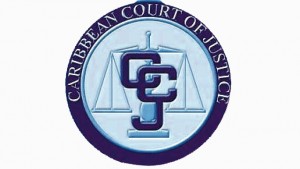
CCJ Logo
A senior academic yesterday rejected arguments being put forward in favour of the Caribbean Court of Justice (CCJ) becoming the country’s final court, but said any decision in embracing the CCJ must be made by the people.
“This is an opportunity for us to get our people involved in the discourse. I have no view, one way or another, whether the CCJ should be the final court of Jamaica, (but) what I believe is that the arguments that have been put forward are unconvincing. I don’t see how people in an international organisation, unaccountable to the state of Jamaica, unregulated by the public service regulatory control, can exercise such a critical part of our governance. But, in the long run, it has to be the decision of the Jamaican people,” said Dr Leighton Jackson, deputy dean at the Faculty of Law, University of the West Indies (UWI) Mona Campus.
Dr Jackson, at the same time, warned against those with power perpetuating a “plantation” style of governance in which the people are managed and not consulted — an obvious jab at the possibility of the nation’s parliamentarians making a decision on the country’s final court instead of the people having a say. The UWI, he said, has a duty to weigh in on the issue and get the ordinary Jamaican interested.
Dr Jackson was speaking, Tuesday night, at a public forum on ‘The CCJ — Modern democratic Constitutional Governance in the Commonwealth Caribbean’, on the Mona campus of the UWI. The forum was part of the university’s 2015 Research Days activities.
According to the deputy dean, Jamaica and other Caribbean countries need to tread cautiously as, like the Privy Council, the CCJ, in its appellate jurisdiction, would be an international court. He said this means is that it would have no obligation or accountability to the Jamaican Government.
“It is a limb of Government (in its appellate jurisdiction) over which the Government has no jurisdiction. They operate on their own [so] the whole area of judicial review, for example, would be foreclosed. So the question is, what are the arguments that would allow us to divest such a critical part of our Government to a court that is not accountable [to us], if we come to the conclusion that the Privy Council has to go? Isn’t the CCJ in the same situation as the Privy Council?” he asked.
Dr Jackson contested the idea that Caribbean jurisprudence is rooted in the ideology of integration and wanting to shed the remnants of colonialism. “The argument is flawed because the Privy Council is by no means the most important vestige of our colonial past. We need a have to look into ourselves and ask, do we want autonomy or do we want to cling to these vestiges in a schizophrenic way, and claim that we are independent?”
Jamaica’s legislators have remained deadlocked on the issue after almost two months of debate in the House of Representatives.
Prime Minister Portia Simpson Miller said that switching to the CCJ from the Privy Council, by way of a two-thirds majority vote of both Houses of Parliament, is the right thing to do.
“The Opposition is now being given three months to reflect collectively and individually, and do the honourable and logical thing of agreeing to support Jamaica establishing the CCJ as our final court,” Simpson Miller told the House in the CCJ debate last month.
Opposition Leader Andrew Holness, meanwhile, has insisted that a decision on the CCJ must be made by way of a referendum. “If we are going to establish a final court of appeal, let us do it the correct way,” Holness said during the debate.
The vote in the House on the on three Bills, tabled in July 2014, to move the process along has been set back to April 28 to allow for the three-month break between the closing of the debate and the vote on the bills as part of a constitutional requirement.
